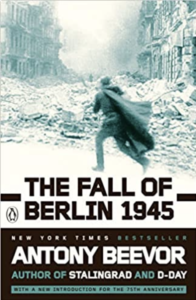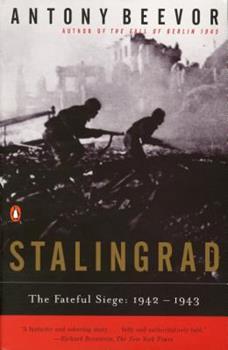 I so thoroughly enjoyed Antony Beevor’s history of the siege of Stalingrad I ordered The Fall of Berlin 1945. I’m about halfway through the 430 page book and, like Stalingrad, it’s a page-turner. No work of fiction –movie, novel, TV documentary series– could ever capture the scope and horror of these events.
I so thoroughly enjoyed Antony Beevor’s history of the siege of Stalingrad I ordered The Fall of Berlin 1945. I’m about halfway through the 430 page book and, like Stalingrad, it’s a page-turner. No work of fiction –movie, novel, TV documentary series– could ever capture the scope and horror of these events.
As with all (most?) non-fiction books, I’m reading with a marker in hand, highlighting the passages I want to save. Like so much of the history I’ve read, I’m finding eerie parallels to current events. Nazism and Trumpism; Hitler and Trump the most obvious example.
“We may go down, but we will take the world with us.” — Adolph Hitler (1945)
“(Hitler’s) monstrous vanity could not allow him to lose a foreign capital, even one which he had totally destroyed.”
“The Soviet armies advancing in huge, long columns were an extraordinary mixture of modern and medieval: tank troops in padded black helmets, their T-34s churning up the earth as they dipped and rolled with the ground, Cossack cavalrymen on shaggy mounts with loot strapped to the saddle, Lend-Lease Studebakers and Dodges towing light field guns, open Chevrolets with tarpaulin-covered mortars in the back and tractors hauling great howitzers, all eventually followed by a second echelon in horse-drawn carts.”
“The population at large saw nothing of Hitler. He had disappeared from the newsreels, and they heard only Hitler’s very last broadcast on 30 January, marking twelve years of Nazi government. His voice had lost all its strength and sounded completely different.”
“Berlin’s population in early April (1945) stood at anything between 3 and 3.5 million people, including around 120,000 infants. When General Reymann raised the problem of feeding these children at a meeting in the Reich Chancellery bunker, Hitler stared at him. ‘There are no children of that age left in Berlin,’ he said. Reymann finally understood that his supreme commander had no contact with human reality.”
“On the evening of 12 April 1945, the Berlin philharmonic gave its last performance. It is said that after the performance, the Nazi party had organized Hitler youth members to stand in uniform, with baskets of cyanide capsules, and offer them to members of the audience as they left. “
“The only promise Hitler has kept is the one he made before coming to power. Give me ten years and you will not be able to recognize Germany.”
“A smaller size of (German)steel helmet had been manufactured for boy soldiers, but not nearly enough were produced.”
“On the morning of Saturday 21 April, just after the last Allied air raid had finished, General Reymann’s (Berlin) headquarters (was) swarmed with brown uniforms. Senior Nazi Party officials had rushed there to obtain the necessary authorization to leave Berlin. […] Over 2,000 passes were signed for the Party ‘armchair warriors’, who had always been so ready to condemn the army for retreating.”
“An intensive artillery bombardment of Berlin began at 9.30 a.m., a couple of hours after the end of the last Allied air raid. Hitler’s SS adjutant, Otto Günsche, reported that the Führer, a few minutes after having been woken, emerged unshaven and angry in the bunker corridor which served as an anteroom. ‘What’s going on? he shouted at General Burgdorf, Colonel von Below and Günsche. ‘Where’s this firing coming from?’”
“(Hitler’s) severe personality disorder, even if it could not quite be defined as mental illness, had certainly made him deranged. Hitler had so utterly identified himself with the German people that he believed that anybody who opposed him was opposing the German people as a whole; and that if he were to die, the German people could not survive without him.”
“In the (Berlin) cellars and air-raid shelters distinctive subcultures had grown up during two years of heavy air raids. […] The ‘cellar tribe’ as one diarist called these curious microcosms of society, produced a wide variety of characters, whether in markedly rich or poor districts. Each cellar always seemed to have at least one crashing bore, usually a Nazi trying to justify his belief in the Führer and final victory.” […] “Many cellar tribes developed a particular superstition or theory of survival. For example, some believed that they would survive an almost direct hit by wrapping a towel round their head. Others were convinced that if they bent forward at the first explosion, this would prevent their lungs from tearing. Every eccentricity of German hypochondria seems to have received full expression.”

 I’ve only read a handful of history books (crime fiction is my passion) but they’ve all be great reads. A Distant Mirror: The Calamitous 14th Century; Battle Cry of Freedom: The Civ89l War Era; Nothing Like It In the World: The Men Who Built the Transcontinental Railroad 1863-1869; and Wires West: The Story of the Talking Wires. I’m currently reading STALINGRAD The Fateful Siege: 1942-1943 by
I’ve only read a handful of history books (crime fiction is my passion) but they’ve all be great reads. A Distant Mirror: The Calamitous 14th Century; Battle Cry of Freedom: The Civ89l War Era; Nothing Like It In the World: The Men Who Built the Transcontinental Railroad 1863-1869; and Wires West: The Story of the Talking Wires. I’m currently reading STALINGRAD The Fateful Siege: 1942-1943 by